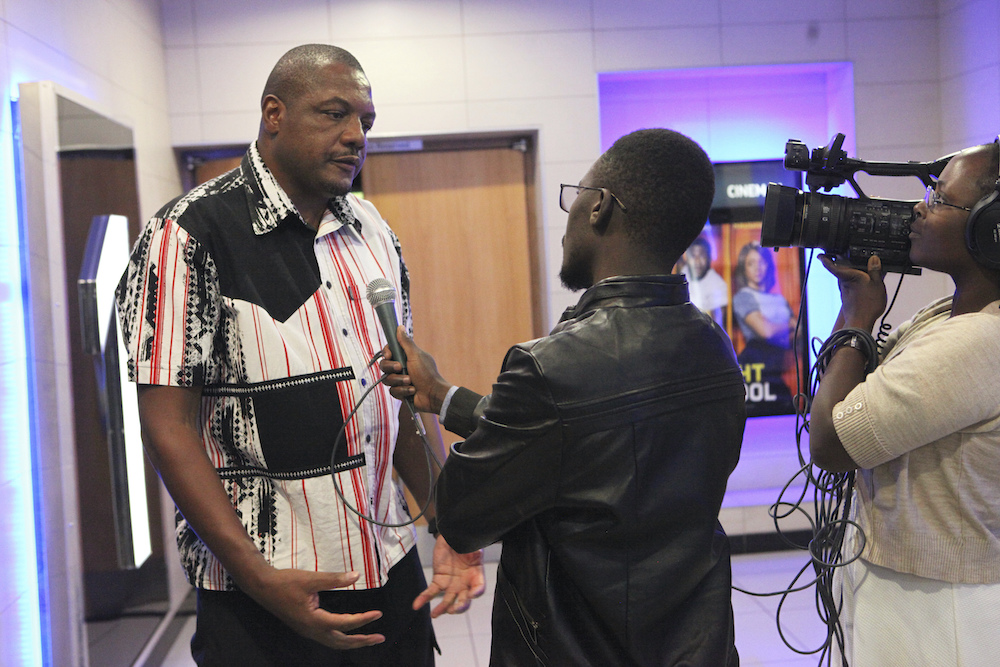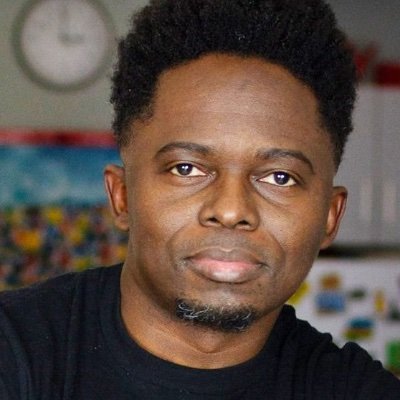
Zimbabwe journalist Hopewell Chino'ono, left, speaks to state media during the launch of his documentary “State of Mind” in 2018. Chino'ono, a prominent journalist, was arrested by state forces on July 20
On the morning of July 20, 2020, a group of men arrived at the Harare home of Zimbabwean journalist Hopewell Chin’ono, smashed a glass door to gain access and took him away. “They are breaking into my home. Alert the world!” tweeted Chin’ono.
Chin’ono, a 2010 Nieman Fellow, then live-streamed, on Facebook, a short video of a group of men entering the room in his house where they supposedly picked him up. As the door opened, they ordered him to turn off his phone. A few hours after his abduction his Twitter account was no longer active.
He was later located at Harare Central Police Station, where his lawyer was denied access to him. The police made a statement that he had been arrested and was to spend the night in jail and appear in court on Tuesday.
Opposition politician, Jacob Ngarivhume, one of the organizers of a mass protest scheduled for the end of July, was also picked up on the same day. The two have been charged with “incitement to participate in public violence.”
To understand the significance of these arrests, we need to go back to November 2017. Robert Mugabe, who had ruled Zimbabwe since 1980, was thrown out of office by his Vice President, Emerson Mnangagwa, with the support of the army in a swiftly executed coup d’etat. They gave Mugabe the opportunity to save face by asking him to ‘resign.’ A few days later, he conceded.
Millions of Zimbabweans celebrated his downfall. Thousands took to the streets in towns across the country and danced for joy. Many hugged the soldiers who were out on patrol to ensure the new leadership was not challenged.
Mugabe had overseen the decline of Zimbabwe’s economy from one which had helped other countries in Africa with food security in the 1980s to one which was perpetually holding out its hands for aid. In the 20 or so years that preceded Mugabe’s downfall, the Zimbabwean dollar had lost so much value that it had been discontinued, the economy had flatlined and millions of Zimbabweans had left the country.
When Morgan Tsvangirai’s Movement for Democratic Change (MDC), formed in 1999, became the first opposition party in Zimbabwe to truly challenge the ruling ZANU (PF) it was met with the abuse, arrests, intimidation and beatings of various party members.
ZANU (PF) also engaged in underhand tactics to ensure victory in elections and was accused of outright rigging several times after numerous inconsistencies were unearthed in the voting process. An example is the 2013 elections where the Zimbabwe Election Support Network cited gross irregularities in the voters roll, among other issues.
Mugabe’s government routinely harassed and intimidated journalists. In January 2001, the printing presses of The Daily News, an independent newspaper which was highly critical of the government, was bombed. No one was injured, and it is still unknown who carried out the attack. The paper continued to run and was shut down by the government in 2003.
So the jubilation Zimbabweans felt in November 2017 came with the hope that perhaps things would get easier for them. Perhaps Mugabe’s henchmen, needing to prove they were different from the man they had overthrown, would be better leaders. Perhaps the economy would improve and life would get easier again. Perhaps…
Mnangagwa, even while trying to charm the world into believing he was cut from a different cloth, quickly shredded his goodwill with the people. At the end of July 2018, general elections took place in Zimbabwe. The results were delayed and when they came out on August 1, Mnangagwa had narrowly won. Supporters of the opposition MDC alleged vote rigging and took to the streets in protest. The army was deployed and in the capital, Harare, fired live ammunition into crowds of protestors. Six people died. Dozens were injured.
Then a few months later, in January 2019, as food and fuel shortages became acute and as prices shot out of reach of most people, more protests broke out. The police and the army cracked down heavily on citizens. The Internet was shut down for several days, and Zimbabweans in the Diaspora lost contact with their loved ones as WhatsApp, the biggest messaging app in the country, failed to deliver messages. Facebook and Twitter were offline, too, for most people.
Under the cover of social media silence, state security agents went on a rampage, beating people up, pulling young men from their homes and taking some of them away to be crammed into already overcrowded jail cells. Scores of women reported being raped. A dozen people were shot dead. A further 78 were reportedly treated for gunshot wounds.
Zimbabweans started to speak out. One of the loudest of these voices was Hopewell Chin’ono. Using primarily Twitter and Facebook, he shed light on the corruption taking place in the government and the worsening situation for ordinary Zimbabweans.
In June, he wrote about the corrupt dealings at the Ministry of Health, which saw the government purchasing personal protective equipment meant to help with COVID-19 mitigation efforts at inflated prices. The exposition of the $60 million-scandal led to the sacking of the Minister of Health, Obadiah Moyo.
Through a series of Facebook posts, Chin’ono also alleged that the President’s son, Collins Mnangagwa, was involved in corrupt dealings. The acting ZANU (PF) spokesperson, Patrick Chinamasa, made a statement on June 4 warning journalists in general, and Chin’ono specifically, against attacking the First Family. “We have noted the systematic targeted attacks on the first family members … by unscrupulous characters like Hopewell Chin’ono targeting the president’s son,” Chinamasa said.
Chin’ono responded on Twitter, “My life is now in danger after Zanu-PF attacked me personally through their spokesperson Patrick Chinamasa. I am only a detractor of corruption … I am a trained journalist, if I have said something that is not true, legal remedies are there. I will not be cowed to fear.”
His Twitter following grew to 163,000 as he continued to point out areas where the government was failing to deal with corruption and address the crumbling economy.
While Chin’ono is the most high-profile journalist to be targeted by the Mnangagwa regime, he is not the only person to be harassed. In August 2019, comedian and satirist Samantha Kureya was abducted and reportedly beaten, made to undress and forced to drink sewer water by a group of men who asked her why she and her colleagues at the comedy outfit Bustop TV continued to make fun of the government.
Other violations against journalists include the arrests of Frank Chikowore, Samuel Takawira, Leopold Munhende, Rex Mphisa, and Beatific Ngumbwanda.
The Zimbabwe branch of the Media Institute of Southern Africa (MISA) has also documented several cases of harassment of journalists by the police and the military around the country.
Today, Zimbabweans talk often about that moment of jubilation on the streets one wildly impossible November. For millions born after 1980 it was, ironically, in the throes of the coup that they first tasted the hope that a change of leadership can bring. Now, that day, November 21, 2017, is a sour flashpoint of collective memory. It is common to hear people say that things are worse under the new regime.
Fadzayi Mahere, a Zimbabwean lawyer and opposition politician, summed up this sentiment eloquently in an August 2019 opinion piece for The Guardian: “Mnangagwa has failed at the most basic political reform. The mask has fallen away leaving in its stead a man more brutal and devoid of character than his predecessor.”


